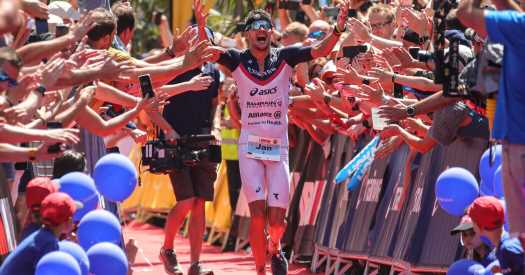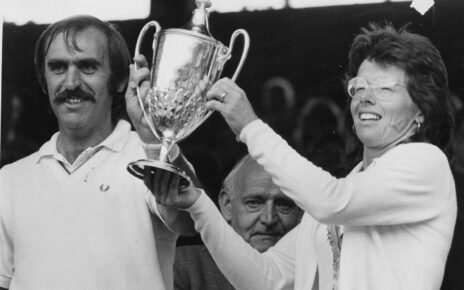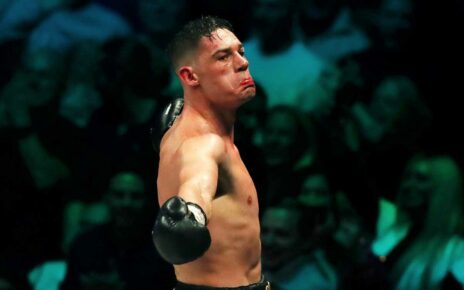The end of an athletic career arrives for everyone, even Jan Frodeno, who is widely recognized as the greatest male triathlete ever.
Frodeno, who won the triathlon gold medal for Germany at the 2008 Olympics, three Ironman world championships, two half-Ironman world championships, and set the long-distance triathlon world record, is retiring at the end of this season. He will race in the United States for the last time Friday in the U.S. Open event in Milwaukee before competing in a final Ironman World Championship in Nice, France, this fall.
At 41, Frodeno said he had finally found something he loved more than racing — raising his kids, Lucca, 7 and Sienna, 5. Triathlon training is a selfish beast, requiring a mental and physical dedication that does not leave a lot of room for quality family time. He will still show up at triathlon events, he said, and participate in some of them, too, but his days of competing for championships will end after this season.
In an interview from Milwaukee, Frodeno explained why he’s calling it quits and why he has no plans to make pizza and beer staples of his diet.
This interview has been edited for length and clarity.
So this is your last time competing in the U.S. and your second to last race?
It’s the last time with proper butterflies and racing for titles.
What drove this decision?
If I’m perfectly honest, my kids. It’s probably the first time I enjoy something more than my sport — being a dad — and that’s a dangerous place to be as a professional athlete. When you lose that fierce competitiveness and that angry edge, everything calms down a little bit. That’s a great recipe for a balanced life, but it’s not a recipe to win championships.
How did you balance training through their early childhood?
My wife and family have done the heavy lifting, and I’ve tried to be there as much as I can, but I’m just a little tired of saying no to my kids. No, sorry, I can’t play soccer. ‘Daddy, Can we do a race?’ No, my knee hurts. I’m 41 and my performance is there. The numbers are looking good. But that wild egoism that’s needed to put down 40-hour training weeks and shut off everything else, that’s fading.
Have you been traveling for training as well as racing?
I’ve always decided to move to places where I can train well. We moved to Andorra about 18 months ago, and training at altitude there is really good. There’s a surprisingly large amount of high-performance athletes living there. It’s an incredible place to raise children. My kids go skiing three times a week in the winter, and I’m like, ‘Oh, I’d love to come ski. But, you know, I’ve got to keep that body in shape.’
What will you miss about the sport?
The black and whiteness of it. You either make it or you don’t. Overall, life is a lot more gray. You’re subject to other people’s judgments.
What won’t you miss?
I will have to chat with you in six months. It’s going to be hard finding something to identify as. People ask me: ‘What do you do?’ I’m a professional athlete. It’s not a job, it’s my calling. It’s who I am. It’s part of my identity, and to find that level of dedication — to feel that you put hundreds and thousands of hours into something without feeling like you’re sacrificing — that’s going to be hard to find a second time.
How has the sport evolved during your career?
When I started off, it was a pen and pencil, and at the end of every week, you’d hand in your training sheet to the coach. Everything now is so much more measured and calculated. You have applications for everything and you have wearables and trackers, and, in that sense, it’s become so much more sophisticated.
In terms of nutrition, when I started off, if you took a small bottle of water on a large bike ride, the goal was to not finish that. Now it’s about grams of carbohydrates per hour and figuring out the details. And that provides a higher level of competition.
Do you miss the instinctual aspects of the training?
I’m old school. I love the simple concept of running up a hill as fast as you can. There’s just that and a stopwatch, and that to me is pure — and pureness is rare and something very beautiful.
What was initially your favorite part of the race — the swim, the bike or the run?
The first four weeks after off-season, running is generally not the most pleasant sport. But by the time the season comes around and competition kicks in, that floating feeling of running and just being with yourself and your emotions and judging your effort off your breath and the acidity levels in your body, that’s extremely rewarding.
Will your diet change once you stop training at the highest level?
I’ve drilled myself into believing that what you put in is what you’ll get out. Eating healthy and balanced is probably something that’s given me longevity. I’ll have a pizza here and there. It’s fine. I’ll happily have a beer with some friends, but I don’t think you’ll find me at the bar at 6 p.m. any time soon. I think I’ll be eating a lot less pasta and rice, perhaps a bit more meat or fish, which I would generally avoid.
I imagine you’re not going to sit on the couch and watch snooker and football all day?
That would mean I’d have to buy a TV. So, it’s not happening any time soon. I think I’ll just dibble and dabble in other sports, take on a few more risky sports, go mountain biking, go skiing, go backcountry skiing. I hope I’ll just have a bit more energy and not be so tired all the time. I have a love for movement. I need it. Otherwise, I’m a pretty pesky person to be around.
Are you a hiking family, or do you not see the point of walking up a hill when you can run?
I never thought I’d go hiking, but we’ve done a couple of hikes, and it turns out to be more fun than you would have thought. There is a virtue to seeing more along the path.
Any other activities you’re excited for?
Surfing. Water sports. Foil surfing. All the things where you can properly hurt yourself. Triathletes are very, very good at what we do and completely useless at everything else. I have to do some coordination work.
Matthew Futterman is a veteran sports journalist and the author of two books, “Running to the Edge: A Band of Misfits and the Guru Who Unlocked the Secrets of Speed” and “Players: How Sports Became a Business.” More about Matthew Futterman
Source: Read Full Article


